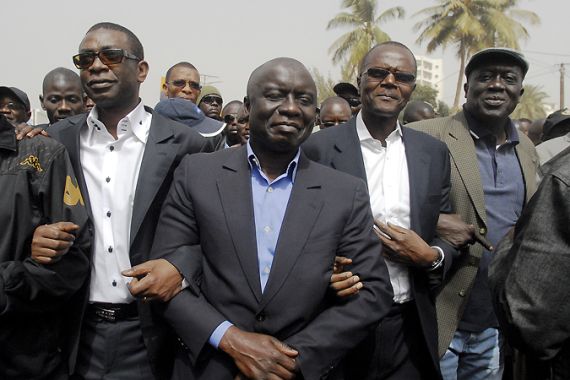Senegal election: Main opposition candidates
Thirteen candidates will compete against President Wade in Senegal’s presidential poll on February 26.

Thirteen candidates will compete against the Abdoulaye Wade, Senegal’s incumbent president, in elections to take place on February 26.
The opposition’s failure to unite behind a single candidate has severely diminished their chances of challenging Wade at the polls.
Politics in Senegal has always been largely driven by personalities and personal rivalries. Campaigning for the upcoming presidential vote has proved to be no different, with opposition candidates busy pushing their individual presidential claims.
The presence of so many rival claimants in the fray has meant there is no frontrunner opposition candidate. Here is a look at four prominent ones:
| Idrissa Seck |
 |
| Seck was once considered President Wade’s protege [EPA] |
Having served as Wade’s election campaign director and prime minister between 2002-2004, Seck, 51, was once considered the incumbent president’s protege.
Seck became a leading member of the opposition after he fell out with Wade. In late 2006, he formed the Rewmi party (‘the country’ in Wolof) and ran in the 2007 presidential election, coming second with 14.92 per cent of the vote.
Besides being the Mayor of Thies, he is the youngest of the prominent candidates and is likely to attract the youth vote.
However, the opposition failing to agree on a single candidate, Seck is unlikely draw enough votes to compete with Wade.
| Macky Sall |
As a member of the Sengalese Democratic Party (PDS), Sall, 51, served as Senegal’s PM between April 2004 and June 2007 and was also the president of the National Assembly between June 2007 and November 2008.
 |
| Sall was Wade’s campaign director in 2007 [EPA] |
He was also the director of Wade’s re-election campaign for the 2007 presidential elections.
Relations soured between Wade and Sall when the latter questioned the role of Karim Wade, the president’s son, in alleged irregularities concerning construction sites for Organisation of the Islamic Conference (OIC) held in early 2008.
Wade loyalists viewed Sall’s move as a covert attempt to undermine Karim and bolster his chances of becoming the president.
After the fall-out, Sall formed his own party, the Alliance for the Republic (APR-Yakaar), to compete in the 2012 elections.
| Ousmane Tanor Dieng |
Another stalwart Senegalese politician, Ousmane Tanor Dieng, 65, is the first secretary of the Socialist Party and was appointed diplomatic adviser to Leopold Senghor, the country’s first president, in 1978.
 |
| In 2007 presidential polls, Dieng secured 14 per cent of the vote [EPA] |
He continued in the same position during the Abdou Diouf presidency, until 1988. In 1993, he became the minister in charge of presidential services until 2000.
Dieng ran for president in 2007, and secured almost 14 per cent of the vote, after Wade and Idrissa Seck.
In 2011, Dieng and Moustapha Niasse formed the Beno Siggil Senegal in a bid to forward one opposition candidate to challenge Wade, but when the coalition decided to back Niasse, Dieng withdrew. He said that it would have undermined the ‘weight of the Socialist Party’ to not compete for president especially after securing more than double the votes Niasse had received in 2007.
Dieng promises that this would be his last bid for the presidency.
| Moustapha Niasse |
 |
| Niasse’s political careers spans more than four decades [EPA] |
Moustapha Niasse, 72, has had a colourful career in Senegalese politics and international diplomacy. In a career spanning more than four decades, Niasse served in a variety of government roles, including that of the minister of foreign affairs between 1978-1984, and between 1993-1998.
He was also appointed the prime minister in 1983, before the post was abolished. Niasse has also competed for the presidency on three occasions.
After competing in the 2000 elections for his own party, the Alliance of the Forces of Progress (AFP) and securing third place, he supported Wade in the run-off in exchange for the PM position., a post that he assumed in 2000.
In 2011, Beno Siggil Senegal appointed Niasse as their candidate. However, with the withdrawal of Dieng and the Socialists from the coaltion, it is unlikely that Niasse will make a severe dent at the presidential poll.